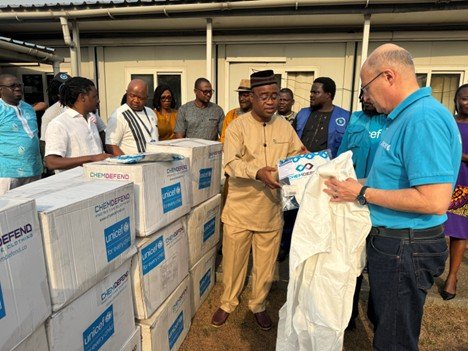Dakar/Freetown, 18 June 2025 — As the Sierra Leone Government battles the third Mpox outbreak in the country, UNICEF is stepping up with comprehensive action to safeguard communities and support the acceleration of the national response. In close partnership with the Government, the Ministry of Health, the National Public Health Agency, and global partners, UNICEF is driving critical interventions to curb the spread of Mpox.
Sierra Leone is facing its third Mpox outbreak, officially declared on 13 January 2025 after the first case was confirmed on 10 January. As of 17 June, there have been over 4000 confirmed cases and 25 deaths, with most patients recovering. The outbreak mainly affects people aged 20–39, especially women aged 20–29, and is concentrated in the Western district.
“This Mpox outbreak is a stark reminder of how quickly lives can be disrupted, especially for the most vulnerable — children and families,” said Rudolf Schwenk, UNICEF Representative in Sierra Leone. “UNICEF is working with the Government and partners to deliver urgent support — from vaccines and safe water to trusted information and psychosocial support — so that communities can stay safe, informed, and resilient.”
With over $600,000 already invested, UNICEF is driving Mpox prevention and control efforts across Sierra Leone through risk communication, WASH improvements, education, child protection, and vaccination initiatives.
“UNICEF remains committed to supporting Sierra Leone’s efforts to bring the Mpox outbreak under control. With strong coordination and sustained investment, we can protect the most vulnerable and prevent further spread,” said Gilles Fagninou, Regional Director, UNICEF West and Central Africa. “Now is the time for collective action and solidarity to ensure families and communities are protected.”
UNICEF’s Critical Contributions:
- Vaccine Access and Delivery: In March, UNICEF procured and delivered 58,000 Mpox vaccine doses with support from Gavi. Gavi has just confirmed an additional allocation of 50,000 doses, bringing their total contribution to nearly 110,000 vaccines and US$700,000 in funding to support the vaccine rollout in Sierra Leone. To ensure an effective rollout, UNICEF also expanded cold chain systems, provided vaccination supplies such as needles and syringes, and printed 100,000 vaccination cards. These life-saving vaccines are key to protecting health workers, close contacts, and preventing further spread of the virus.
- Safe Healthcare Environments: At Connaught Hospital’s isolation centre in Freetown, UNICEF rehabilitated the water system, installed three 5,000-liter water tanks, and upgraded piping to ensure a reliable supply of safe drinking water and hygiene for patients and health workers.
- PPE Distribution for Frontline Workers: To protect those on the frontlines of the Mpox response, UNICEF provided 60,000 PPE kits (Personal Protection Equipment) earlier this year. These kits are supporting health workers, vaccinators, social mobilizers, contact tracers, and caregivers involved in patient care and community outreach.
- Protecting Schools with Hygiene and Safety: To prevent Mpox transmission in learning environments, UNICEF is distributing over 10,000 hygiene kits — including buckets, wastewater containers, and soap — to schools in Western Urban, Western Rural, Bombali, and Port Loko. Each kit includes Prevention of Sexual Exploitation and Abuse (PSEA) messaging to reinforce safety and accountability.
- Community Engagement at Scale: UNICEF is leading Risk Communication and Community Engagement (RCCE) by training 240 district supervisors and health workers, while rolling out targeted social media campaigns and digital content across all 16 districts. These efforts help counter misinformation and connect families to essential services — including the toll-free 116 child protection line.
- Psychosocial Support: With assistance from UNICEF, the Ministry of Social Welfare is training social workers and providers to deliver vital care in outbreak-affected communities.
In the coming weeks, UNICEF will support the rollout of an additional 75,000 vaccine doses and enhance cross-border collaboration with Liberia to share best practices. The response is coordinated through a robust Incident Management Team (IMT), bringing together UNICEF, WHO, Africa CDC, and other partners in a united, multisectoral effort to contain the outbreak.
Additional resources from partners, UNICEF’s core funding, and the Pandemic Fund — a global mechanism that supports outbreak preparedness — are helping sustain the response. However, critical gaps remain in vaccine supply, surveillance, case management, and community engagement. Urgent and increased support is needed to fully meet demand, stop transmission, and bring the outbreak under control.
UNICEF’s unwavering commitment ensures that children and communities across Sierra Leone receive the protection, care, and accurate information they need to overcome Mpox — now and in the future.
For media inquiries, please contact:
Suzanne Wooster, swooster@unicef.org
Jean Jacques Simon, jsimon@unicef.org
About UNICEF
UNICEF works in some of the world’s toughest places, to reach the world’s most disadvantaged children. Across more than 190 countries and territories, we work for every child, everywhere, to build a better world for everyone.
For more information about UNICEF and its work for children in Sierra Leone, visit https://www.unicef.org/sierraleone
Follow UNICEF Sierra Leone on Twitter, Facebook, Instagram and YouTube




